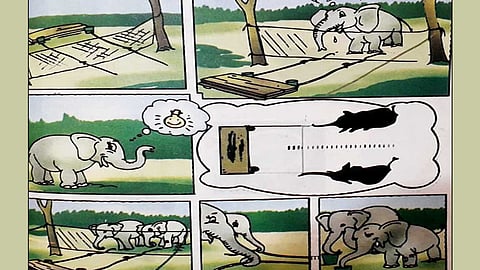
- முகப்பு
- கல்கி
- மங்கையர் மலர்
- தீபம்
- கோகுலம்/Gokulam
- முக்கிய பிரிவுகள்முக்கிய பிரிவுகள்
- தொகுப்புகள்தொகுப்புகள்
- Premium

Let's say I put you and a friend in a room, which has a fruit dangling from the roof. There are two stools - one with a broader base than the other. Both stools together would give you the height needed to reach the fruit. What would you do?
One of you would place the stool with the broader base on the floor, and the other on top of it. Then the second person would climb up and get the fruit. Sounds like common sense? Actually, it is due to cognitive ability, a trait that enables us to put together a series of actions to get an out- come. However, working together would not be possible unless we co- operate with each other. But how did we develop our cognitive ability and cooperation? Scientists look for an answer by observing animals - the species that evolved before us.
As scientists have found out, some animals – like elephants – exhibit advanced cooperative abilities.
Elephants are social animals - they live in families and care for the young. Joshua Plotnik, a psychologist, recently conducted experiments to see if elephants could pass the cooperation test.
In this test, two apes were kept behind a door with bars. A sliding tray laden with food was placed on the other side of the door. The apes could not reach the tray, and it was too heavy for one ape to pull. The apes had to tug the tray together to get the food. Chimpanzees passed the test with flying colours.
Adapting the test, Plotnik kept two buckets filled with corn in front of a sliding platform, and put a rope through the platform. The rope ends were extended into the lane where the elephants came for feeding. If an elephant pulled only one end of the rope or pulled it before its partner got a grip, the rope would slide s out. Only if both elephants pulled the two ends together could they get the food. A fence barred the elephants from reaching the platform.
Twelve elephants at the Thai Elephant Conservation Centre in Lampang were put to the test. The elephants quickly learned to pull the rope ends at the same time, and hauled the corn within a few trials!
To complicate things, the scientists held back one elephant first. However, the elephant which came early waited patiently for its partner. Thus, they had understood the crucial role played by the partner. In another case, researchers coiled one end of the rope and placed it beyond the reach of the partner. In such cases, one of the elephants often turned away, even if its partner was in place!
Very few species of animals have passed the "cooperation test". Crows, for instance, could not wait long enough for a helping beak. Plotnik hopes to test dogs and dolphins too. Such studies, scientists hope, will provide a clue as to how cognition evolved and how we came to be the way we are today!
